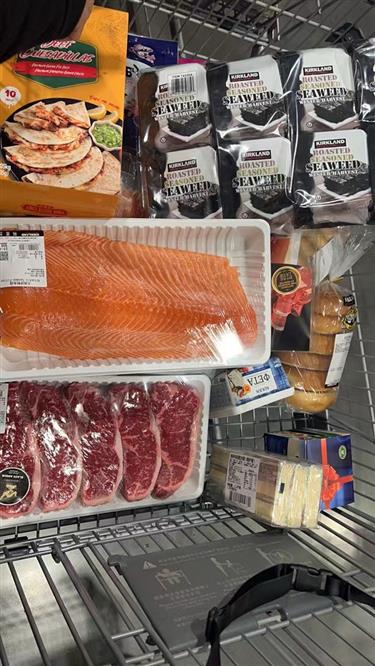Savvy shoppers have a wider choice when it comes to buying groceries
Editor's note:
High-quality growth, the most-mentioned phrase during the Two Sessions, will keep guiding China's new route of development. As a bellwether city, Shanghai takes a model role in mapping out a growth of high quality, and here are what we find in different sectors of our life.

A Costco employee speaks with customers as they wait in line on the opening day of the Pudong store on March 10.
Paying to shop at a supermarket may seem to be a waste of money, let alone paying for two membership plans at one time. However, many are willing payers, and they have made it trendy.
Shanghai consultant Chen Xiaoyi, who has been comparing prices and product types from Costco and Alibaba's grocery chain Freshippo, believes that shopping at the two stores with different plans is a wise decision.
"Costco has more imported and Western-style cooking materials, whereas I prefer pre-cooked dishes and local seasonal food at Freshippo," she explained.
She didn't hesitate to pay 199 yuan (US$28) for a one-year membership at the Pudong Costco store after learning that it was a 20-minute drive from her home.
"There are over a dozen cheeses to choose from at Costco, whereas Freshippo has a much larger selection of Chinese-style dishes, instant food and pre-cooked packs," she explained.
It offered a special discount of 100 yuan off the original fee of 299 yuan in advance of the new opening.
She spent about 1,800 yuan on the first day of the new store's opening, when discounts were offered on salmon, bakery items, and other fresh foods.
Shoppers are certainly becoming more savvy when it comes to deciding where to buy groceries and what types to buy at specific stores.

On the opening day of the Costco Pudong store last Friday, a shopper shows off her purchase. Discounts were given on salmon, beef and bakeries.
Despite the lack of delivery service, which is now required by all major retailers such as RT Mart, Walmart and Metro, the store remains appealing to those looking for new product types and ways to save money on their grocery shopping.
The Minhang store, which opened in 2019, made to the top 10 stores out of over 800 Costco locations worldwide in terms of average purchase amount.
Senior Vice President of Costco Asia Richard Chang believes the Shanghai market is now "more mature and catching up with developed markets," with a strong willingness to spend on products that provide good value for money.
Shanghai is the only city in the country with two Costco stores, as well as a dozen membership-only supermarkets from Sam's Club, Freshippo and Metro.

The Pudong store features a wide selection of Kirkland products from Costco's house brand. The new supermarket has drawn large crowds due to its new product types and value for money offerings.
The State Council's work report delivered during the latest session of the National People's Congress prioritized stimulating domestic consumption and expanding lifestyle services.
Customers are reconsidering their grocery shopping plans as the pandemic fades, and retailers are upgrading their offerings.
Customers' strong sentiment and willingness to spend on groceries and consumer goods are being backed by multinational and local retailers. Walmart's Sam's Club also accelerated its expansion in China last year, with the opening of six new locations, the most since the company entered the country more than two decades ago.
On the domestic supply side, local supermarket chains are expanding their connections with fresh farm products in order to differentiate themselves from retailers selling imported goods.
To ensure supply to the local market, Shanghai is encouraging online retailers to expand their collaboration with agricultural product bases.
Over the last year, special campaigns have been launched to help promote local agricultural products and strengthen ties with growers and distributors.

Walmart's Sam's Club also accelerated its expansion in China last year, with the opening of six new locations, the most since the company first entered the country more than two decades ago.
A framework for high-quality agricultural development will be established in Shanghai by 2025, according to the Shanghai Agricultural Commission, and several intelligent vegetable and fruit gardens will be established to promote intelligent agricultural production bases.
New models have emerged to connect with local farms.
To diversify the supply of spring seasonal fresh farm products, Meituan has partnered with farmers' cooperatives in Qingpu District.
It added roughly one-third more seasonal spring vegetables than last year, and sales of popular varieties like goji leaves and broad beans more than doubled.
Sourcing and shipping vegetables from farms on the outskirts of the city to supermarket outlets and delivery sites' warehouses could keep them as fresh as possible while reducing waste from transportation, according to Zhu Hongfang, a researcher at the Horticulture Research Institute of the Shanghai Academy of Agricultural Sciences.
Freshippo will add 11 farming bases in eight towns in the Pudong New Area over the next two years, sourcing directly from local growers and implementing smart supply chain facilities.
To meet the grocery chain's supply and distribution demands, the seeding, growing and crop protection processes will adhere to strict protocols.

Shanghai's latest five-year plan encourages digital retailers to strengthen ties with local suppliers and promote intelligent agricultural production bases.
















